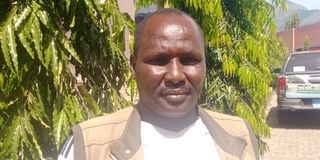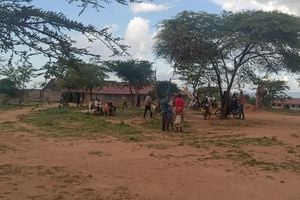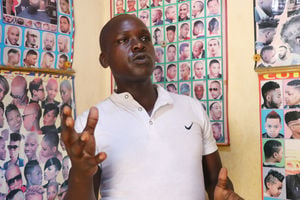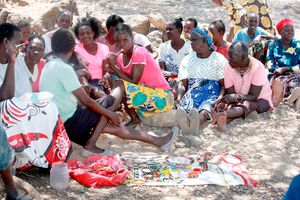
Lobot Ngirolem during an interview with Nation on October 31, 2024 on the sidelines of a high-level meeting of leaders from Kenya, South Sudan and Uganda to discuss peaceful coexistence and regional integration at Moroto in Uganda.
On October 31, 2024, Lobot Ngirolem, donning a Real Madrid jersey, a faded brown half jacket, and sporty pants, sat pensively behind elected leaders from Kenya, South Sudan, and Uganda in a conference room in Moroto town.
He was among the few herders from border pastoral communities in Tri-junction region comprising Turkana (Kenya), Karamojong (Uganda), and South Sudan's Toposa and Didinga, rubbing shoulders with Rebecca Kadaga, First Deputy Prime Minister of Uganda and Minister for East African Community Affairs, at a high-level meeting of leaders to discuss peaceful coexistence and regional integration.
What struck Ngirolem’s mind was how Kadaga, Kenya's Arid and Semi-Arid Areas and Regional Development Cabinet Secretary Beatrice Askul, Governor of South Sudan's Eastern Equatorial State Lobong Lojore, and all elected leaders who rose to speak identified illegal guns as the main source of insecurity in the region.
As part of the resolutions, the leaders agreed to unite and mobilise the community to participate in the simultaneous disarmament process and rally them to embrace alternative sources of livelihood, cross-border trade, and support efforts by the respective governments to develop the border areas.
He linked the deliberations to June 20, 2023 fatherly advice from Uganda President Yoweri Museveni. A group of Karachuna (reformed Karimojong warriors), met him at State House Entebbe.
"The president told us to completely stop the tendency of cattle rustling among the Karimojong clans and in the neighboring areas to help the government plan better for the sub-region, noting that the government can't create wealth when there's chaos," Mr Ngirolem said.
The president said that if Karimojong could stop cattle rustling, his government would easily deal with communities from neighbouring countries who would infiltrate the region with illegal firearms.
Mr Museveni reportedly narrated to them how he managed to convince the Banyankore tribe in the cattle corridor to switch from nomadism to commercial dairy farming which has since uplifted their welfare.
"President told us it was high time to change our nomadic nature where we must move from one place to the other and embrace peace so that the government and partners can invest in development activities that will improve our living standards. Just like the Banyankore, we can generate daily income through embracing dairy farming and crop production," the reformed warrior said.
He said that since he came back from Entebbe, where he had an opportunity to interact with Banyankore who had diversified their livelihoods with crop production, his life has changed.
The father of seven says he has two wives one in Kenya and the other in Uganda where he is a registered citizen.
"I went to meet the President as Pius Acholia living in the Karamoja sub-region but in Kenya, I am Ngirolem from West Pokot County where I own livestock. Conflicts in both regions will affect me that is why I have told my seven children not to follow in my past footsteps of cattle rustling," he explained.
He recalled that living at the border had many economic advantages and that is why he first apologised to President Museveni for causing the insecurities in the sub-region and promised to preach peace to those still engaging in cattle rustling.
"I raided neighbouring communities, including Turkana, and killed many people while security personnel and my counterpart killed my relatives and peers but that has not helped me. It is good we hand over illegal guns and give the governments room to protect us as civilians and develop the region," Ngirolem said.
He said he is now determined to protect future generations from the devastation he experienced, by being at the forefront of peace-building initiatives at the borders.
He urged the respective governments with support from the East African Community (EAC) Secretariat, the African Union Commission, and the GIZ-African Union Border Programme who organised the meeting to address conflicts over scarce water and pasture by developing resource-sharing agreements.
EAC Deputy Secretary-General in charge of Infrastructure, Productive, Social and Political Sectors Andrea Malueth said to promote peace along the Tri-junction border, in June last year engaged community representatives in a peace caravan and benchmarking tour for border communities in selected areas where border and boundary issues have been peacefully and successfully resolved for experiential learning at Namanga on the Kenya-Tanzania border, Kenya side.
"The overall objective of the caravan is to promote peaceful co-existence, good neighbourliness, and peaceful resolution of disputes among border communities through experiential learning from best practices of other border communities in the region," Malueth said.
"The resolutions after the peace caravan informed us to plan this high-level meeting of leaders as well as community sensitization on peaceful co-existence at border areas," he said.
He challenged leaders to set a timeframe for their agreed resolutions for easy coordination.
"Border residents should allow governments and partners to implement infrastructure development initiatives to enhance the economic and social development of the region," Malueth said.
He noted that the peace caravan and benchmarking tour is anchored in Articles 5, 6, 123, and 124 of the Treaty for Establishment of the EAC as well as Article 4 of the EAC Protocol on Peace and Security.
“In these provisions, EAC partner states commit to the promotion of peace and security, peaceful co-existence and good neighborliness among States as well as peaceful resolution of disputes,” said Mr Malueth.
The leaders resolved to use traditional and alternative dispute resolution mechanisms to manage and resolve conflicts at the community level and agreed to establish joint resource management committees to address resource scarcity and prevent resource-based conflicts between communities.
The leaders further urged the governments of Kenya and Uganda to prioritise the signing of a resource-sharing agreement to ensure equitable access and usage of shared resources, benefiting border communities. In addition, they urged their Governments to prioritize the construction of roads, markets, abattoirs, and other essential infrastructure.
The first Deputy Prime Minister and the Minister acknowledged the Kenyan government for establishing
Lokiriama and Lokichoggio Sub Counties because it would improve government presence at the border for improved security and services.
"Peace at the border will ensure that rich mineral resources in the region are exploited. The border communities should now take their children to school so that they manage the resources instead of relying on experts from other communities or countries," Ms Kadaga said.
Kadaga said Uganda was committed to tackling illegal firearms in the Karamoja region where during drought more than 30,000 pastoralists from Kenya cross over for pasture and water migrate.
"To get rid of illegal firearms in the region, the government of Uganda is implementing a fingerprinting system for both police and civilian-owned firearms creating a forensic database for crime investigation," Kadaga said.
She noted that Uganda is also committed to ensuring public safety for those who are not armed at the border by deploying police officers from the Anti Stock Theft Unit to combat livestock theft besides the ongoing security operation by the Uganda People's Defence Force (UPDF).
To ensure long-lasting peace and development along the border of Kenya and Uganda she said that there is an existing Memorandum of Understanding on the cross-border transformation agenda for Uganda (Karamoja and Sebei) and Kenya (Turkana and West Pokot) that will be signed during the upcoming summit of the two Heads of State in Moroto Uganda.
"The government of Uganda is also dedicated to improving infrastructure at peaceful corridors. The Suam One-Stop Border Post is nearing completion on the Ugandan side while the 73 kilometers tarmac road from Kapchorwa to Suam has been completed," Ms Kadaga said.
Ms Askul said that despite deliberate attempts by governments to disarm communities, there are those who have always still owned guns.
"We support the simultaneous disarmament exercise and propose that corridors, where people have embraced peace and surrendered firearms, should be prioritized for development," Ms Askul said.
She said the government of Kenya had constructed three dams at the border to address conflicts related to scarcity of water.
"We have constructed dams at Naku'etum in Turkana, Kases in West Pokot, and Forore-Aldere in Marsabit. We have also installed the Nasal solarized borehole in West Pokot and constructed Urum water distribution systems in Turkana. There is also ongoing research into conflict dynamics and adaptation mechanisms among Turkana, Pokot, and Karimojong communities," Ms Askul said.
Governor Lojore affirmed the longstanding historical and cultural ties among the communities living along the border, noting that maintaining peace was key to spurring economic development in the border areas.
He acknowledged that challenges posed by unresolved international border issues, long-standing resource-based conflicts, cattle rustling, and lack of alternative livelihoods, have strained relations and hampered development across the region.
He asked border residents to leave the boundary issues to the respective governments and easily allow livestock to move freely in search of pasture citing boundary contestation, delimitation, and demarcation as root causes of disputes that have allowed new conflict drivers to emerge prolonging tensions.
Turkana Woman Representative Cecilia Ngitit called on the government of Kenya to deploy Kenya Defence Forces at the international border to assure residents of their safety and security.
She also appealed for establishment of one stop border posts to streamline and facilitate trade and movement of goods and people at Lokiriama, Nadapal and Kibish border towns.
She said that there was also a need to support the empowerment of women and youth in leadership roles to ensure inclusive decision-making and sustainable peace-building.
The leaders noted that their commitment to ensuring peaceful coexistence can't be achieved without support from respective governments, EAC, the African Union, and other partners.
They also requested respective governments to provide requisite resources to expedite the delimitation, demarcation, and reaffirmation of their boundaries.
The leaders are at Narus in South Sudan sensitizing Toposa and Didinga communities on peaceful coexistence after having a similar exercise at Lokichoggio in Kenya.








